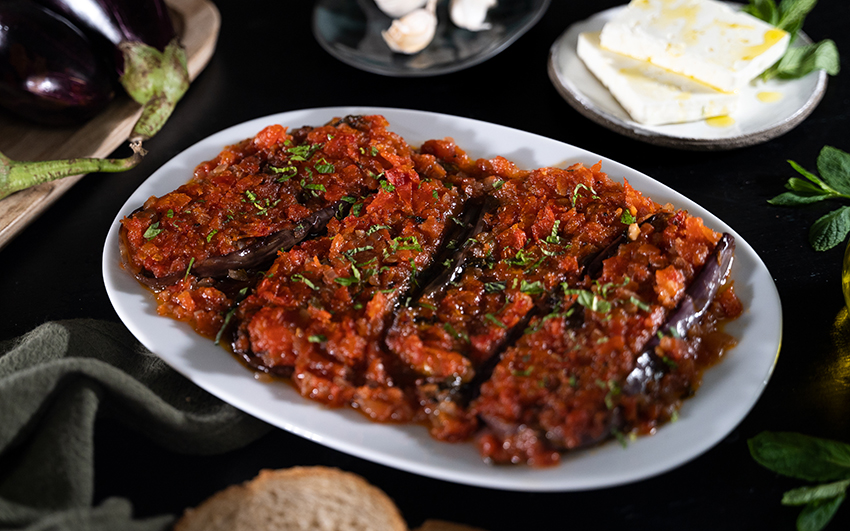Mykonos Melopita (Honey-Cheese Pie)
A traditional honey-and-cheese pie from Mykonos,...

© Digital Minds
Chef: Christoforos Pescias
Preparation & Cooking time: 3h and 45min
Serves: 6
Imam Bayildi might not sound like a Greek dish. That’s because it was introduced to the local cuisine by Greek refugees from Asia Minor not more than a century ago. The name of the dish literally translates to “the imam fainted,” and there are many variations of stories of imams fainting, explaining the origin of the name. Some say a Turkish imam fainted from its intoxicating smell, others that it was simply from overeating. We are partial to the tale of the imam who marries the daughter of an olive oil merchant, getting as the dowry 12 jars of good olive oil. On the day after their wedding, his new wife cooked him the dish, and he enjoyed it so much he asked her to make it again the next day, and the next day for twelve days. On the thirteenth day, she informed him that they were out of olive oil, the dowry was gone, and down he went.
Important for understanding that story is that imam belongs to the type of Greek dishes known as “lathera” (literally translating to “oily”, vegetable dishes cooked in copious amounts of olive oil), and using generous amounts of good olive oil is essential.
Trim the stem off your eggplants. If they are thick, then cut them in half. If they are very thin, cut off and discard a thin slice lengthwise.
Score the flesh side of the eggplants in a square pattern using a sharp knife, without poking through the skin, and place them skin down in an ovenproof pan. Sprinkle generously with salt, and let rest for about an hour.
Meanwhile, prepare the sauce. Peel the tomatoes, cut them in half and remove the seeds. Dice finely.
Heat 60 milliliters of olive oil in a large pot over medium-high heat, and sauté the onions along with the whole garlic cloves for about 5-6 minutes, until slightly softened.
Add the tomatoes, salt and pepper and cook for about 10-12 minutes, until the liquid has reduced somewhat. Set aside.
Once the eggplants have rested with the salt for an hour, pick each of them up and squeeze to remove liquid. This ensures a less watery and greasy, sweeter, and more flavorful result.
Give the eggplants a quick rinse, squeeze to remove liquid again, and pat them dry with paper towels.
In a large frying pan, heat a generous amount of olive oil, at least 2-3 centimeters deep, over medium-high heat. Once hot, add as many eggplants as can fit in the pan, flesh down, and fry for 4-5 minutes, until partly softened. Turn them over and fry for another minute skin down. Continue frying all your eggplants in batches.
Preheat your oven to 150° C.
Place your eggplants in an ovenproof pan. Preferably, they should just fit. Sprinkle with the mint, and top with your tomato sauce, discarding the garlic cloves.
Cook in the oven for 1 ½-2 hours, until the top is caramelized.
Remove the imam from the pan carefully using a slotted spoon, allowing some of the excess oil to drain, and serve.
Tip: Many traditional recipes for imam recommend that the eggplants should be pressed down in the middle, to make little “boats” for the sauce to be placed inside. By not doing this, and instead covering the entire surface of the eggplants with the sauce, the whole dish becomes melt-in-your-mouth delicious.
This recipe was previously published in Greek at gastronomos.gr.
12 large Tsakonian eggplants (or substitute small Italian eggplants)
2k ripe tomatoes
5-6 onions, finely diced
the leaves from 1 bunch of fresh mint, roughly chopped
salt and freshly ground pepper
lots of olive oil
A traditional honey-and-cheese pie from Mykonos,...
Discover how Christos, Athens’ master souvlaki...
Francesca Chanioti, a home cook from...
Beyond souvlaki lies a carnivore’s paradise,...